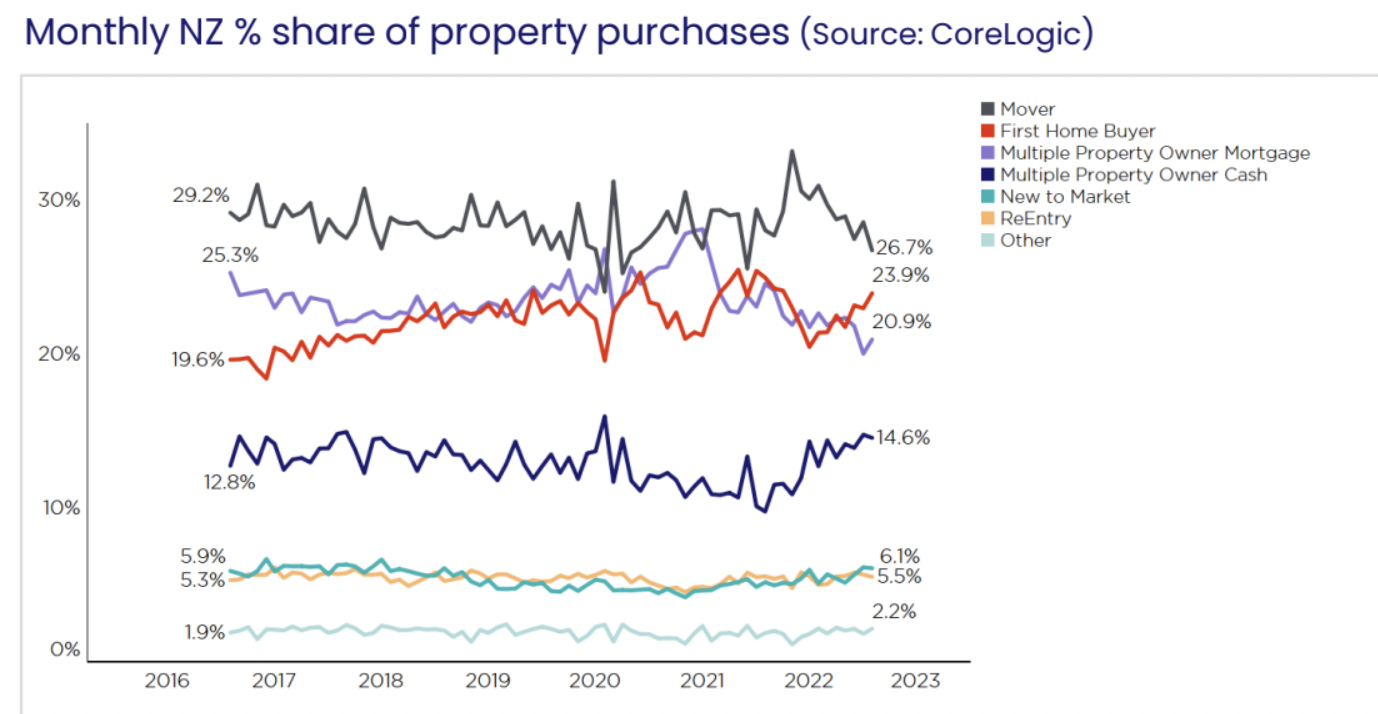Broken down by size, it’s the smaller players that drove up mortgaged investors’ overall market share in the initial post-Covid burst, but they’re also now accounting for the weakness at just a 20.9% market share. At the peak they had nearly a 30% market share.
Mortgaged multiple property owning investors have been in the firing line lately, as Government/Reserve Bank regulation has ramped up, and the simple economics of being a landlord have also turned against them.
These hurdles have included ring-fencing of tax losses, the extension of the Brightline Test, the removal of interest deductibility, the 40% deposit requirement, and then the sharply widening gap between gross rental yields (low) and mortgage rates (high) – meaning that ‘top ups’ are almost inevitable for anybody making a new purchase lately.
CoreLogic chief economist Kelvin Davidson says given all of that, it’s no surprise that its data has shown a low percentage market share of purchases for mortgaged investors lately, and on top of that, it’s a low share in a quiet market*.
On the flipside, cashed up investors have been enjoying conditions, with their market share currently hovering at 14.6% - a relatively high level. “Some of these purchases won’t be cash per se, rather they’re likely to have involved the reshuffling (increasing) of debt on other properties in a portfolio, in order to free up the equity for the latest purchase. Even so, in the current environment of expensive and restricted credit, cash buyers will be seeing opportunities.”
Breakdown of investors’ purchasing by size
The overall market share for mortgaged investors by number of properties owned after their latest purchase means many are essentially new investors – in most cases, owning their own home and just recently buying their first rental.
The spike in overall investor activity post-COVID was driven by smaller players, i.e., investors with two to four properties.
However, since early last year, their market shares have been sliding lower, as well as investors with five to nine properties to some degree as well.
Davidson says this seems logical – the “newbie” investors probably had the most anxiety about all of the regulatory changes being pushed through, as well as probably having less equity behind them, and also a greater eye on alternative “safer| investments, such as term deposits, which are again starting to pay better returns.
He says existing investors aren’t selling to any great degree an, new builds still a target for investors, given favourable deposit and tax treatment.
“That said, the slight caveat is that although investors with two properties market share has fallen quite sharply, they started higher, and their market share is still comparable to past troughs. By contrast, investors with three to four properties, for example, are below previous troughs.
By contrast, apart from the really large buyers – investors with 10 plus properties – the cash investor groups have pretty much raised their market share lately across the board.
Davidson says with credit conditions set to remain testing for a while yet – especially with formal caps on debt-to-income ratios now needing to be added to medium-term considerations – cashed up investors may well hold on to a decent market share next year, although the number of property sales are expected to stay fairly low.
“The converse is that the percentage share for mortgaged investors looks set to continue to struggle into next year – although it also needs to be acknowledged that some would-be investors will have actively chosen to pull back, with the aim of buying something cheaper later. That time could well next year, if they can navigate the mortgage hurdles.”
One final point, says Davidson (something to jot down in the diary for a few years away yet) – given the flurry of investor purchases in the 12 to 18 months after Covid first hit, with large capital gains subsequently accruing, and the fact these purchases had a five-year brightline period, watch for some kind of potential sell-off in 2025-26.




 Search
Search
